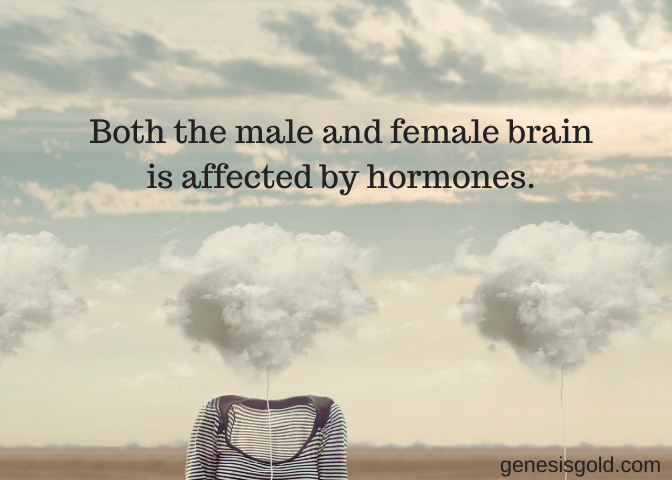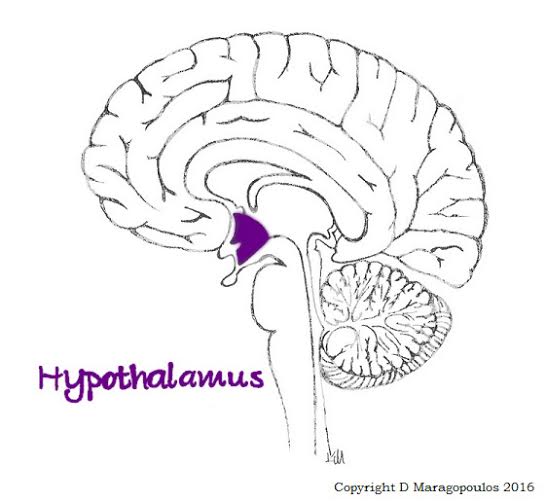What is brain fog? And why is it more common when you go through menopause?
Brain fog is a layman’s term for your brain not functioning properly. You have trouble remembering words, numbers, or why you walked into a room. You may have trouble concentrating or focusing. It definitely involves short term memory issues, but it might mean you also have trouble remembering common words, or even the name of someone you might know well.
Brain fog can be triggered by hormonal transitions.
Women will notice premenstrually and during their periods that their short-term memory and focus can be a little bit off. And kids in puberty definitely have a shift in their ability to concentrate and focus. Brain fog is very common for women going through the change, starting in perimenopause and extending through postmenopause.
Hormones affect the way your brain functions in terms of your cognition and focus. But there’s a hormone that isn’t often discussed that influences our hormonal transitions from puberty all the way through post-menopause. It’s called prolactin.
Prolactin was discovered in nursing mothers and is short for pro-lactation. Prolactin is very high in breastfeeding women, because it actually promotes lactation. It’s also high during pregnancy.
However, both men and women make prolactin, mostly at night, as prolactin controls your immune function. If prolactin levels are high during the day, then it can actually interfere with the function of neurotransmitters and other hormones.
High levels of prolactin protect pregnant women from the high levels of other growth-promoting hormones that help the fetus to develop so that the mother does not develop tumors. Prolactin has a protective effect, which is why it’s high at nighttime. Prolactin actually creates an anesthetic effect, putting you into deeper sleep while it triggers your immune system to clean house. This is very important because what your body does at night to keep you healthy requires you to be in a deep state that Prolactin induces.
So how is prolactin related to brain fog?
Hormones, especially estrogen, stimulate neurotransmitters in your brain that are responsible for your memory and focus. So if prolactin is blocking hormone receptors, your brain is not making enough neurotransmitters to function properly, resulting in brain fog.
During the change, as your hormones plummet, you begin to notice more and more brain fog. It’s incredibly common and is one of the more annoying symptoms that women suffer from during the change of life. Low estrogen levels in menopause mean less serotonin production, which affects your focus. Low progesterone levels mean less GABA, which keeps you calm. Lower dopamine levels in menopause contribute to prolactin becoming dyscircadian, meaning higher during the day than at night. This is because it’s hypothalamic dopamine that turns off prolactin production and helps you wake up. Dopamine is your learning neurotransmitter.
There are some other hormones that can affect the way the brain functions.
For example, cortisol affects how the brain works, as does adrenaline. Cortisol follows adrenaline production to fuel a fight or flight response, and if cortisol is not used, then it becomes catabolic, actually breaking down tissues.
High stress leads to chronic high cortisol levels, which will break down the protective myelin sheath around the nerves. The myelin allows the nerve impulse to fire properly, allowing you to access information in your brain. When you’re in menopause, you don’t have enough progesterone to repair the myelin sheath, so your brain becomes more and more foggy.
I have three tips to help you heal your menopausal brain fog.
#1- Balance Your Hypothalamus
If your hypothalamus is in balance while you’re going through the change, it can help balance your other hormones and neurotransmitters. That’s because your hypothalamus is the gatekeeper for the amino acids for all neurotransmitter production, and particularly controls dopamine production. Your hypothalamus also controls prolactin production. If your hypothalamic-pituitary-adrenal axis is out of balance, too much cortisol will contribute to your brain fog. If your hypothalamus is dysfunctional, it cannot help you make enough neurotransmitters for your brain to function optimally. So balancing your hypothalamus with nutraceutical support like Genesis Gold can help clear your brain fog.
#2 – Nutrition for Your Brain
It is very important to make sure you’re eating foods that support healthy brain chemistry.
One of the healthiest foods for your brain is healthy fat. The monounsaturated fats in olive oil and avocado oil are excellent at keeping the brain healthy and well-lubricated. Additionally, the omega-threes in fatty fish are excellent at keeping your brain healthy. Fat helps to heal the neurological pathways, so if you’re not eating healthy fats, your brain tissue breaks down.
#3 – Exercise for Your Brain
When you’re menopausal, it’s especially important to exercise, because being sedentary actually contributes to dementia. Aerobic exercise increases vascular flow, and also helps to maintain healthy cellular metabolism, which means you’re burning energy a little bit faster. You’ve got to get glucose into the neurons so that they can function normally. It’s really important that you exercise on a regular basis at least three times a week to really help reverse your brain fog.
Menopausal brain fog is real, and it can be a real nuisance for those who experience it. However, you have the power to heal your brain by balancing your hypothalamus, eating healthy fats, and exercising regularly.
If you’re interested in talking more about the many symptoms of menopause, join our Hormone Support Group, where I answer your questions live. You can access the group by signing up for my free Hormone Reboot Training.

If you ever “lost” something you just put down or entered a room and forgot why you went, you have experienced mental fog. It’s common when the sex steroids — specifically estrogen — decline, whether briefly in the premenstrual period or permanently at menopause or andropause (the male equivalence).
The link between brain function and hormones is well established.
Elevated prolactin levels are associated with bipolar depression, schizophrenia, and mood disorders. Prolactin is naturally elevated in pregnant and lactating women – its name is derived from promoting lactation. In the rest of us, prolactin is naturally high at night providing the necessary anesthetic effect for our immune system to function properly. Prolactin blocks the receptor sites for steroid hormones making the brain impermeable to estrogen. Without estrogen, thought is impaired, serotonin levels drop, sleep becomes disturbed.
Hormones are not just a female phenomena. Low testosterone has also been implicated in mood disorders. Many of my male patients come in with prescriptions for anti-anxiety drugs or anti-depressants. No one checked their hormones. Many are suffering the effects of low testosterone production. With testosterone replacement or supplementation to encourage their own production, these men are much happier.
Lush hormones keep young brains bright and juicy – it’s a watery matrix that neurotransmitters float through to initiate electrical impulses in the brain. When hormones are properly balanced, you can teach an old dog new tricks. My hormonally challenged patients are often overwhelmed with information at the first consultation, but once we get their hormones harmonized, they retain the “endocrine 101” lecture material well enough to teach their friends about the importance of balanced hormones. Many of my fifty plus patients return to school to pursue graduate degrees, work on their doctorates, even start new careers but only after their physiology is optimized.
Just hang out with a woman about a couple of days before her menses and witness the power of hormones. As her sex steroids plummet so does her demeanor. Not all women suffer from PMS but most will admit to feeling different, less tolerant, more emotional than the rest of the month.
Not just female hormones, but male hormones affect the brain.
Believe me, I see many middle aged men prescribed antidepressants or anti-anxiety drugs when in fact their moods are related to declining testosterone. Both the male and female brain are affected by hormones.
But we actually have three brains. Yes, three. One in our head, one in our chest, and one in our gut. The heart is the really number one brain. The aboriginals knew this truth and today science is proving that the heart gets first preference of resources for neurotransmitters.
Neurotransmitters are the hormones of the nervous system. And they’re produced by the gut as well as the heart. Ever been nervous before a big event? While your brain fusses over possible outcomes, your heart races, and your stomach rumbles. In fact, conventional medicine often treats irritable bowel syndrome with antidepressants and everyone knows that you can die of a broken heart (really severe depression means very little serotonin for the heart to function).
You can live without a functional brain (coma) but not without a functional heart. And if your digestive tract cannot absorb nutrients, you’ll starve to death without medical intervention.
Now let’s explore the immune system.
You know when you’re under a lot of stress and you become sick. You catch a common cold virus or break out in cold sores (the herpes virus). Stress affects the adrenal glands which in turn affects the immune system.
In the heart chakra lies the thymus – an endocrine gland responsible for programming the white blood cells to know the difference between you and other. Other what? Germs: viruses, bacteria, fungi, even weird cells like cancer. White blood cells (WBC) attack other and spare you. They do so best when you are asleep. Under the influence of melatonin produced by the pineal gland in the crown chakra the body shuts down normal daytime function and switches into nocturnal mode. The adrenals stop producing the stress hormones adrenaline and cortisol and begin to produce metakephalins that stimulate the thymus to program the WBC’s. All hormones, all the time!
High stress means high adrenaline and cortisol production interfering with sleep and effectively turning off the immune system making you vulnerable to infection and over a very long period of time, cancer.
Think of the WBC as the pony express. The WBC can travel anywhere in the body, even pass the blood brain barrier delivering messages called cytokines. Cytokines are the tiniest of the “hormones”. These minute messengers instigate the immune response whether that be hives in response to an allergen or the attack of an invading virus. The amazing WBC carry on its cell membranes information about all the hormones, all the neurotransmitters, and all the cytokines in the body during its lifetime.
The neuro-immune-endocrine system is a massive communication network that makes the global internet look like child’s play.
So if the neuro-immune-endocrine system is the software for the human computer, what’s the operating system?
Your Hypothalamus

In the center of your brain, your hypothalamus lies vastly unappreciated. Part neurological tissue and part endocrine tissue, the hypothalamus is largely ignored by neurologists as a primitive brain structure. Endocrinologists pay it little heed because they cannot measure its hormones without sacrificing the lab animal. But the hypothalamus is crucial to life.
Your hypothalamus orchestrates your entire symphony of hormones.
If your hormones are harmonious, you are healthy, vital, youthful, vibrant.
If your hormones are out of harmony, you are sick, tired, aging, stressed, and eventually dis-eased!
So to help the Hormonally Challenged, I focus on the maestro — the hypothalamus. And for that, I use Genesis Gold®*. It’s helped me and many others clear brain fog. Especially entering midlife, I certainly do not wish to get lost in a fog of hormonal incompetence. How nice it is to think clearly, have motivation, and enough focus to complete my projects.
And for the younger set, stress and poor diet can lead to premature brain fog. How many young adults are diagnosed with Attention Deficit Disorder and prescribed amphetamines to speed up their starving brains? For that matter how many children are given speed instead of nutrition? Too many.

Genesis Gold® has helped many of my learning disabled patients — both children and adults. In combination with Sacred Seven amino acids for that extra hypothalamic support and a high quality Essential Fatty Acid — Genesis Gold® provides a natural balance to help avoid or get off of prescription amphetamines.*
Integrative health is a blend of the best of conventional and alternative therapies. Yet without excellent nutrition, the body struggles to heal itself. How many of us can get everything we need in our daily diets? I know I don’t. In spite of growing most of our fruits and vegetables, in spite of eating organic and avoiding processed foods, in spite of following a healthy Mediterranean diet, I know my body needs more. So I give it nutracuetical support with Genesis Gold®. And I am aging much more gracefully. Thank goodness.
May your Hormones be in Harmony,
Deborah Maragopoulos MN FNP
Intuitive Integrative Health
*Statements not reviewed by the FDA.
Research: Menopause and the Human Hypothalamus: Evidence for the Role of Kisspeptin/Neurokinin B Neurons in the Regulation of Estrogen Negative Feedback, The Interrelationship Between Serum Pituitary Hormones in Healthy Adults



0 Comments